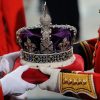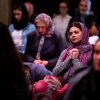Beware of false prophets, which come to you in sheep’s clothing, but inwardly they are ravening wolves. Ye shall know them by their fruits. – Matthew 15-16
In his 2001 book Bobos in Paradise, author David Brooks coins a new word, Bobo (pronounced to rhyme with “go-go”), to describe the new elites of the modern age. This group combine the Bourgeois worldview of capitalist enterprise with the hippie values of Bohemian counterculture on social and moral issues – thus Bourgeois-Bohemian, or Bobo.
In the two decades since the book was published, the world has changed a great deal. No longer does the West simply fight wars to secure democracy around the world, but the governments of “enlightened” secular societies team up with corporations and big tech to promote new “progressive” values worldwide – sexual promiscuity, gender confusion, racial politicization, and family destabilization.
It should be no surprise that in the decades since its debut, the Bobo has found its way into all areas of life, including places as foreign to its spirit as the Orthodox Church. Since the nature of the Church is hopeful, this should provide opportunities for the transformation of the soul of the Orthodox Bobo. Yet the transformation which is at the centre of the Christian life is unthinkable to the Orthodox Bobo: he does not come to be transformed, but to transform everything around him.
And herein lies the beginning of the problem with the Orthodox Bobo.
The secular Bourgeois seeks status, often linked with wealth. For the Orthodox Bobo, this search for status can take different forms, seeking personal prominence through a cultural community, a Church jurisdiction, or representing either one to those outside the Orthodox Church. For converts to the Orthodox Faith, this will sometimes take the form of a living roleplay within the Orthodox Church, of some cultural or religious nostalgia. While this roleplaying will enjoy all the costumes, rituals, and titles that go along with it, the essence of Orthodox Christianity – the faith, life, beliefs, and moral values – won’t be present. These contradict the individualism of the Orthodox Bobo.
On the other side, just as the secular Bohemian seeks individual meaning for their life, the Orthodox Bobo may find within the Church a certain esoteric identity. This identity will only be skin deep, however, and will never be able to permeate to the heart of Christian life. Its secular, Bourgeois impulses are in conflict with Orthodox Christianity, and its Bohemian approach is “spiritual”, rather than fundamentally Christian and Orthodox. As a result, the Orthodox Bobo is left with discovering their spiritual meaning through dabbling with iconography, a fascination with Church services as drama, and an interest in the Jesus Prayer as something “deeply spiritual”. Ongoing repentance, confession, turning away from sins, and the difficult labours of daily prayer are far from the search for meaning the Orthodox Bobo has in mind.
Orthodox Bobos Seek Common Ground on Easy Social Issues. By definition, a Bobo is the combination of Bourgeois elitism and Bohemian social values. To this the Orthodox Bobo adds a veneer of Christianity, the moral emphasis of the Orthodox Bobo must by necessity limit itself to the areas where the aspirations of the three groups to do good coincide. This would include generic issues of agreement, such as caring for the poor, providing housing for the homeless, and preventing violence against women and children – low hanging fruit in terms of risk to anyone’s social reputation. The Orthodox Bobo will never – ever – jeopardize their professional network or aspirations by treading publically on more controversial moral or spiritual questions of our day on which the Orthodox Church is unequivocal: abortion, marriage, sexual morality, or gender identity. If the Orthodox Bobo happens to say anything on these topics, one can be sure it will be in the context of, “I am an Orthodox Christian, but now I know…”, or “Our Orthodox faith teaches us to love everyone” — incomplete statements which misrepresent the thinking, actions, and spiritual life of the Church Fathers.
Orthodox Bobos Call for “Nuance” on Matters on Which the Church Speaks Clearly. Orthodox Bobos insist on soft language, often in the name of exercising kindness. While it has always been the prerogative of the clergy to exercise pastoral economy and mercy toward members of the Church, depending on their individual life and circumstance, Orthodox Bobos call for something different: the total reshaping of the way faithful people think, using tricks and deceptive language. Even on the most clear moral teachings of the Church Fathers (such as abortion or fornication), the Orthodox Bobo will default to the jargon of the culture, using terms like “womens’ health” (for abortion) and “relationships” (for fornication of all kinds), in order to avoid hurt feelings. For a man who suffers from gender confusion (clinically known as gender dysphoria), the Orthodox Bobo will adopt the term “trans woman” – actually a lie, divorced from both the biological and spiritual realities of the person, known by both science and the teaching of every saint of the Orthodox Church. Every change in language also changes the climate of any discussion. In a parish full of Orthodox Bobos, the spiritual environment very soon comes to resemble a liberal Protestant church – or simply a social activist club.
Orthodox Bobos Want to be Loved by the Elites – and Will Say or Believe Whatever it Takes. Alienating the elites of the secular world is a serious taboo for the Orthodox Bobo – and a key measure of whether or not an Orthodox Christian has fallen into Boboism. Where the responsibilities of the Orthodox faith conflict with the demands of the secular world, the Orthodox Bobo will choose the call of the world, since this is the path to worldly success, whether it means a better position, a higher income, or esteem from peers or colleagues. This is also true when it comes to the children of the Orthodox Bobo, for whom the Bobo parent holds earthly ambition to be a citizen of the world, a global competitor, and a recipient of various worldly honors, whether academic, athletic, or otherwise. Whether it is the views of the Orthodox Faith or the time it takes to thoroughly practice it – something the Orthodox Bobo would label as “fanaticism” – the Orthodox Bobo will reliably opt out of anything that would be a challenge to earthly success and networking opportunities.
Orthodox Bobos Venerate the Cult of the Body. From bodybuilding to healthy eating, iron man competitions to long distance races, the achievement of physical fitness is at the apex of the mountain of success for the Orthodox Bobo. While traditional Orthodox cultures are immersed in physical work (as well as prayer and prostrations), it is not uncommon for the Orthodox Bobo to skip Sunday Liturgy to attend a morning sports competition, bonding with their network of secular Bobos, and working out their physical salvation with fear and sweating. The elevation of the importance of the physical body above the eternal soul might be measured in minutes or hours, comparing hours at the gym to hours at the church or in prayer at home. Since the gym makes for a sexy, youthful body, as well as building the professional network, it dovetails nicely with the life goals of the Orthodox Bobo. Sadly, church services and spiritual life offer few of these earthly benefits, and none of the dopamine.
Orthodox Bobos Base Their Decisions on Dreams About an Earthly Future. Orthodox Christians base their decisions on the sacred experience of the past. The Bohemian mind of the Orthodox Bobo is based on the adversarialism of Marxist thinking: the hopeful, intelligent, promising future stands in their minds starkly pitted against the backward, failed, past. Unlike the Orthodox Church which sees the Holy Tradition of the past as containing all God’s wisdom that is worthy of praise, the Orthodox Bobo sees the past as a series of events that are only worthy of blame for all the problems of today. While the Orthodox Church sees Christ and the saints as God’s gift to the world, the Orthodox Bobo sees himself and his generation as that gift – and the future as an even bigger gift, since they believe everything in the world will only get better and better.
Orthodox Bobos Venerate Heroes, Not Saints. Saints of the Orthodox Church are those who have achieved holiness of life through humility, confession of faith in Christ, and giving up this life for eternal life with God. As such, the lives of saints don’t make a lot of sense in the world of the secular Bobo, so an Orthodox Bobo must remain largely silent about them. Where an Orthodox Bobo can speak about a saint, it will be restricted to the context of their culture (the saint of my country) or their family patron, or some saint who is known for a virtue that is celebrated in secular circles (such as dying for a political cause). On the contrary, the reading of books and the celebration of causes championed by contemporary social justice heroes is fair game – indeed, expected ritual – for the Orthodox Bobo. Despite being surrounded with so great a cloud of witnesses in the Orthodox Church, the Orthodox Bobo willingly selects the passing heroes du jour, promoting them to their children, students, and clients as examples to emulate, while forgetting the icons given by God.
Orthodox Bobos are Smarter than The Saints. The Orthodox Bobo believes he is going to improve the Church – rather than be improved by the Church. Like scientists doing centuries worth of experiments, the Orthodox Bobo believes that we know more about God today than the saints did centuries ago. This is called “progressive revelation” – the idea that God is showing us more and more over time, even more than He revealed when He appeared in human flesh on the earth! This is a heresy, and contrary to the Orthodox Faith, yet it fits perfectly into the narcissism of the Orthodox Bobo, who believes he is more advanced and better educated, even than the saints themselves. Like a modern-day prophet, an Orthodox Bobo might believe they are called by God to correct the priests and bishops, in order to put the Church on a new path for a “New Age”. Like the heretics of centuries past, the Orthodox Bobo speaks up for things which appear virtuous and good on the surface, but which upon serious examination run deeply contrary to the widespread testimony of the saints. Orthodox Bobos are wolves in sheep’s clothing – yet in many cases, they are not even aware of this fact themselves, since their beliefs, goals, and lifestyles are so much affirmed and applauded by the secular world around them. They are the saints of the modern secular world, so they ask themselves, why can’t they be the new saints of the Orthodox Church, setting aside the old, outdated kind of saints in the process?
Orthodox Bobos are Iconoclasts. Orthodox Bobos share the iconoclasm of the modern progressive, rejecting established institutions and norms such as the nuclear family, democracy, and western Christian civilization (which Bobos view as “inherently racist”), and the concept that God created human being male and female. Where Bobos use such words, their meanings are twisted and redefined to coerce new converts onto their enlightened team, and away from what they see as the darkness of the past.
Orthodox Bobos Prefer Their Secular Activist Friends to Other Orthodox Christians. Given the choice between their secular, progressive friends and faithful Orthodox Christians, the Orthodox Bobo would choose to spend their time with secular friends every time. Why is this? In a series of studies on the subject, American sociologist George Yancey discovered that Christians who hold moral and spiritual view that are the same as their secular neighbours invariably choose those secular neighbours as friends – even over members of their own church. The reason? In almost every case, activists like the Orthodox Bobo consider their social beliefs to rank more important than their spiritual beliefs and practices, and thus they have more in common with their secular friends. Very often, the Orthodox Bobo views other Orthodox Christians (certainly traditionally-minded ones) as racist, sexist, bigoted, intolerant, stupid, rude, anti-science, and hypocritical, while they view their secular friends as tolerant, egalitarian, intelligent, educated, open-minded, and intellectual. When it comes to opinions on everyday issues and important life choices, Orthodox Bobos approach the big questions of life in the same way as secular, non-believing people. It’s no surprise that the Orthodox Bobo would choose to have non-believers as friends, ahead of other Orthodox Christians, with whom they might have major disagreements – or who might challenge their conscience as members of the Orthodox Church.
The sad fact is, Orthodox Bobos often present themselves as the authentic alternative to the old “ethnic ghetto” church communities – as if Orthodox Bobos represent the contemporary face of Orthodox Christianity. Nothing could be further from the truth.
Let’s be clear: Orthodox Bobos aren’t actually Orthodox Christians, in their thinking, actions, or spiritual life. While they identify as Orthodox because of their baptism at some time in their past, their worldview is firmly conformed to the secular world, and is alien both in spirit and in action from the life and teaching of the martyrs and Church Fathers.
Orthodox Christians must recognize Orthodox Bobos for what they are: individuals bearing a spirit which is contrary to and often outright hostile to the Orthodox Faith and life. Although it is very often veiled in politeness, the mindset of the Orthodox Bobo is not harmless. On the contrary, the Bourgeois-Bohemian worldview is opposed to everything for which Christ died, for which the martyrs suffered , and which the Holy Fathers confessed.
The Orthodox Christian must seek the Cross of Christ, and the path taken by the saints who took up that Cross, and flee the individualism, self-actualization, and narcissism of the Bobo, whether it attacks the Church from inside or from outside.

















